Digital Scavenger Hunt – Assignment 1
I’m kind of intrigued by this assignment…
I feel like we talk a lot about country and folk music in class so I figure I’ll look up something we haven’t discussed much about; punk music. I have no idea if it was around before the 90s, there’s a solid chance it wasn’t, but I want to know.
My first step was using the Google Ngram, I thought it might give me a good jumping off point, so I searched for the word “punk”.
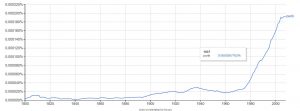
Unfortunately I was unable to capture a decent photo of the graph, however if you look at the line itself, you’ll notice that the word has been around since the 1800. These graphs range from 1800-2018. There are a couple of interesting points where the word punk had a showed up, namely there is an increase in right at 1800, another began in 1900 and, despite a small decrease in 1940, it kept climbing. 1980 saw a serious increase in times the word appeared. I suspect that is about where punk music came to be. Considering the different meanings and uses for the term “punk” I realized I may not have been specific enough with my initial search; so I proceeded to search for the term “punk music”. The results were incredibly different. Just assume that, unless otherwise stated, I mean “punk” as in the genre of music.
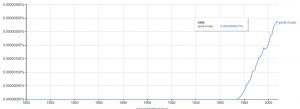
Punk music didn’t appear until right before 1980. I imagine the mid 70s is when the underground phase of punk music began, I believe classic punk bands like The Clash, Sex Pistols, and Ramones formed around then. A quick google search proved I was correct.
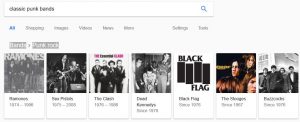
Right before the 90s, the term “punk music” began to plateau and it wasn’t until that era that the term became popular again. I imagine this was the new wave of punk music where bands like Green Day and blink-182 appeared. A Google search of punk bands wielded nearly as many bands as classic punk did.
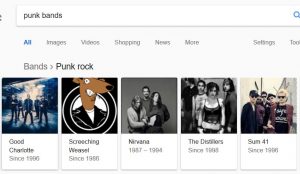
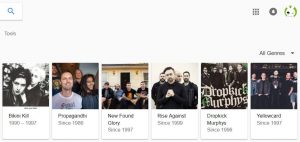
As someone who listens to a lot of punk music, I was curious why some of my favorites didn’t appear on the list. So I figured I’d see when “pop punk” first appeared. What I found was incredibly interesting.
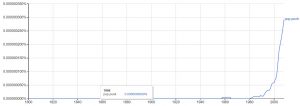
The term first appeared in 1960, which is before punk music had appeared. It made me curious as to how the graphs compared, so I searched for the ngrams together. I was surprised by the sheer amount of times “punk” showed up.
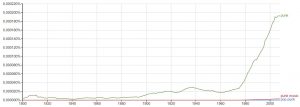
It was clear that there was some disconnect between the terms, my best guess is like I said before, the term “punk” has so many different uses that it’s naturally more generic and will appear more frequently. “Pop punk” and “punk music” are significantly more specific and thus will naturally appear less often. I figures the best comparison I could make was between the more specific two, and so I made ANOTHER ngram (I promise I’m done after this…)
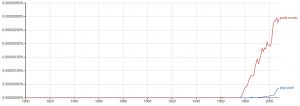 Just for comparisons’ sake I bumped the smoothing down to 1 when I had been consistently keeping it at 3 for the other ngrams so I figured I’d be transparent about that. (All good research is transparent and consistent but this isn’t a research class so I don’t really care.) It’s incredibly hard to notice but right around the 60s, there is a bump in the term “pop punk” and at first I was confused as to why. When looking back at the bands that appeared when I searched earlier, I noticed a few bands were from the 60s like The Stooges and MC5. Now I’d say they’re considered classic punk instead of pop punk, but in their time they may well have been popular punk since it was such a new genre. Further more, any bands that made a lasting impact and made it out of the underground scene would have had to be popular.
Just for comparisons’ sake I bumped the smoothing down to 1 when I had been consistently keeping it at 3 for the other ngrams so I figured I’d be transparent about that. (All good research is transparent and consistent but this isn’t a research class so I don’t really care.) It’s incredibly hard to notice but right around the 60s, there is a bump in the term “pop punk” and at first I was confused as to why. When looking back at the bands that appeared when I searched earlier, I noticed a few bands were from the 60s like The Stooges and MC5. Now I’d say they’re considered classic punk instead of pop punk, but in their time they may well have been popular punk since it was such a new genre. Further more, any bands that made a lasting impact and made it out of the underground scene would have had to be popular.
What’s interesting to me is also is what we classify as punk music. In their early days, bands like Fall Out Boy and Panic! At the Disco would have been considered at least “pop punk”, they appeared in the early 2000s. Their more recent stuff is anything but punk, it’s gone entirely pop. So would bands like those two still be considered punk music? They have the same names and in some cases the same members (*cough cough* Fall Out Boy and NOT Panic! At the Disco— I’m not bitter you are…) On top of the well known bands, there’s a lot of other smaller bands that could be considered punk but none of it is really purely punk. By that I mean bands like Ludo, I Hate Kate, Sugarcult and so many others. With bands like that, you have a mix of genres— so instead of punk you have post-hardcore, indie pop punk rock, alternative punk and so much more. I believe that you can mix almost any genre together, rather any sub-genre. It makes sense, all bands take inspiration from other bands so over course there is some overlap and combining going on.
I decided to take this assignment a step further and pin down the first mention of “pop punk” since it seems to be the earliest term for what I’ve been studying. My results in Google Books from 1/1/1960 to 12/31/1969 turned up one book. It was written by University of Wisconsin–Madison (Center for Limnology) in 1967 titled Limnology News: University of Wisconsin–Madison. The term appears on pg.33 in reference to a smaller Canadian band called The Snitches. I couldn’t find much information about the band other then where they’re from and that they released two albums in Canada. If this is indeed the first use of the term “pop punk”, color me surprised that I have never heard of them and that they’re from Canada.
